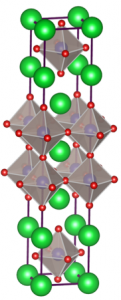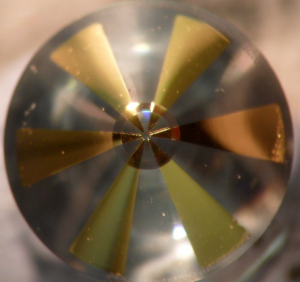Here we group research themes based on materials where strong correlation does not result in superconductivity, but instead other interesting ground states such as Mott or Kondo insulators and heavy Fermion behaviour.
Quantum order in oxide materials Layered 3d, 4d and 5d oxides such as cuprate, ruthenates, and iridates offer an interesting playground to tune effects of electronic bandwidth, electronic correlations, exchange interactions and spin-orbit coupling. We study new electronically ordered phases at low temperature. A recent example [Nature Materials 14, 373-378 (2015)] is Sr3Ru2O7 where an 8T magnetic field induces a spin-density wave and results in a novel ‘nematic’ phase with very anisotropic electronic properties. The phase arises from competing magnetic interactions. We investigate this and other phases by applying uniaxial stress and magnetic field. Measurements are conducted with a combination of x-ray, neutron scattering, transport and thermodynamic measurements.Supervisor(s)Professor Stephen Hayden, University of Bristol
Layered 3d, 4d and 5d oxides such as cuprate, ruthenates, and iridates offer an interesting playground to tune effects of electronic bandwidth, electronic correlations, exchange interactions and spin-orbit coupling. We study new electronically ordered phases at low temperature. A recent example [Nature Materials 14, 373-378 (2015)] is Sr3Ru2O7 where an 8T magnetic field induces a spin-density wave and results in a novel ‘nematic’ phase with very anisotropic electronic properties. The phase arises from competing magnetic interactions. We investigate this and other phases by applying uniaxial stress and magnetic field. Measurements are conducted with a combination of x-ray, neutron scattering, transport and thermodynamic measurements.Supervisor(s)Professor Stephen Hayden, University of Bristol
- High-pressure studies of correlated materials
 High pressure can be exploited as a unique parameter with which to tune the electronic properties of strongly correlated electron materials. By changing the lattice parameters with pressure, we adjust the overlap between atomic orbitals and hence change the electronic structure – for example changing an insulating material into a good conductor. The challenge is to combine such high pressures (achieved with diamond anvils for example) with precision measurements at very high magnetic fields and low temperatures.
High pressure can be exploited as a unique parameter with which to tune the electronic properties of strongly correlated electron materials. By changing the lattice parameters with pressure, we adjust the overlap between atomic orbitals and hence change the electronic structure – for example changing an insulating material into a good conductor. The challenge is to combine such high pressures (achieved with diamond anvils for example) with precision measurements at very high magnetic fields and low temperatures.
Recently we managed, for the first time, to directly measure the Fermi surface of a Mott insulator in its high-pressure metallic state. To do this we used an anvil cell, like the one pictured, combined with a contactless radio frequency technique to measure quantum oscillations in fields close to 40T. We interpret our data using density function theory band-structure calculations.
- Supervisor(s)
- Dr. Sven Friedemann, University of Bristol
